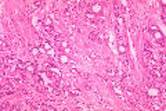Expert Panel Suggests PSA Test May Benefit Some Men
Those with life expectancy of 10 years or more should discuss prostate cancer screen with doctor
 MONDAY, July 16 (HealthDay News) -- Men with a life expectancy of more than 10 years should talk with their doctor about getting a prostate-specific antigen (PSA) test for prostate cancer, an expert panel recommends.
The recommendation, from the American Society of Clinical Oncology (ASCO), is a response to recent guidance from the U.S. Preventive Services Task Force, which in May recommended against PSA screening for prostate cancer.
The ASCO panel recommends doctors discuss the benefits and risks of PSA testing with their symptom-less patients who have a life expectancy of more than 10 years. For men who would probably die earlier, the risks outweigh the benefits, the panel said.
"Men really need to go to their doctor and have a discussion of the risks and benefits of getting the PSA blood test," said panel co-chair Dr. Robert Nam, a uro-oncologist at the Odette Cancer Centre at the Sunnybrook Health Science Centre of the University of Toronto in Canada. "We felt from our review that doing the PSA blood test does save lives in certain groups of men. That's where we differ from the task force recommendation."
Nam's point was that men with serious medical problems such as other cancers, heart failure and chronic obstructive pulmonary disease will most likely die from those diseases long before they succumb to prostate cancer.
For these men, treatment and the side effects associated with treatment might be worse than any benefit, he noted.
"PSA has been a victim of its own success," Nam said. The test's inability to distinguish prostate cancer from an enlarged prostate, called benign prostate hyperplasia, has led to too many unnecessary biopsies.
That's why a PSA test should be part of a diagnosis of prostate cancer, but the diagnosis should also include other risk factors, such as family history, Nam said.
The report was published in the July 16 online edition of the Journal of Clinical Oncology.
The panel's conclusions were based on a study that indicated PSA screening could reduce deaths from prostate cancer by 20 percent among a group of men with more than 10 years of life expectancy, even though it did not cut deaths in other men.
The panel could not agree on when PSA screening should start, Nam noted. However, he thinks 50 is a good time for most men to get their first PSA test. For men who have an increased risk, screening should start earlier, Nam added.
Dr. Anthony D'Amico, chief of radiation oncology at Brigham and Women's Hospital in Boston, said "this is an attempt to educate men about the pluses and minuses of the PSA test, which is good."
PSA, however, is only one factor that can help men understand if they are at risk for prostate cancer, D'Amico noted.
"The other things that need to be discussed are whether they are at high risk for having high-grade prostate cancer -- the kind that kills you," D'Amico said.
These factors include being black or Hispanic, having an abnormal rectal exam or being older and having a family history of prostate cancer, he said.
The age factor is something that is often underestimated, D'Amico added. "The risk of prostate cancer increases with age," he explained.
And, older men are more likely to die from prostate cancer -- 50 percent of prostate cancer deaths are in men over 75, D'Amico said.
When men see their doctor they should discuss whether they are at risk for prostate cancer. If they are, then a PSA test should be considered. If they are at low risk, a PSA test might not be appropriate, he said.
More information
For more on prostate cancer, visit the American Cancer Society  . .

|